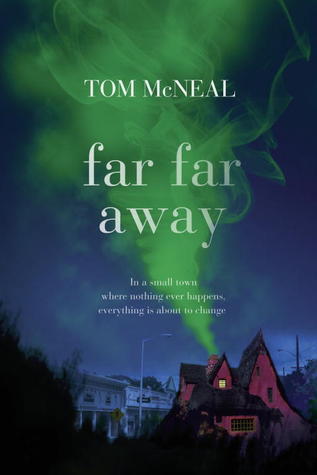 Far Far Away is the story, as the narrator tells us at the outset, of a boy, a girl, and a ghost. The ghost, who is also the narrator, happens to be the spirit of Jacob Grimm, one half of the famous Grimm brothers. The boy is clairaudient - able to hear spirits - and the girl is an ebullient mischief-maker. Their story, and the story of their fairy-tale-ish town, Never Better, would be an idyllic one, if it were not for one additional character: the sinister Finder of Occasions. It is also this character's presence that calls into question whether the book falls within the prescribed Newbery age grange. When he makes his move, the story grows very dark indeed.
Far Far Away is the story, as the narrator tells us at the outset, of a boy, a girl, and a ghost. The ghost, who is also the narrator, happens to be the spirit of Jacob Grimm, one half of the famous Grimm brothers. The boy is clairaudient - able to hear spirits - and the girl is an ebullient mischief-maker. Their story, and the story of their fairy-tale-ish town, Never Better, would be an idyllic one, if it were not for one additional character: the sinister Finder of Occasions. It is also this character's presence that calls into question whether the book falls within the prescribed Newbery age grange. When he makes his move, the story grows very dark indeed.What do the Newbery criteria have to say about age-appropriateness?
2. A “contribution to American literature for children” shall be a book for which children are an intended potential audience. The book displays respect for children’s understandings, abilities, and appreciations. Children are defined as persons of ages up to and including fourteen, and books for this entire age range are to be considered.
Many books fall obviously inside or outside the "up to and including fourteen" range. The Year of Billy Miller is in. Looking for Alaska is out (forgive the old example - I haven't read any YA this year, unless you count the title currently under discussion). Some books are more difficult to categorize. Age of protagonist can be a indicator, but not always - Hattie Ever After feels like a solid middle grade book, despite the fact that Hattie is seventeen or eighteen. Violence and/or sexual content can also catapult a book out of the Newbery range. If all else fails, you can fall back on a rule of thumb I think I first read on the child_lit listserv: a true children's book always ends on a hopeful note.
So how does Far Far Away measure up? Jeremy and Ginger, the main child characters, are fifteen - a little older than the Newbery range, but children do "read up." There's no sexual content more prurient than a chaste kiss on the lips. And the violence, while present, is more suggestive than graphic. Finally, the ending is categorically happy and hopeful, as befits the fairy tale structure.
BUT.
For its last third, just before the happy ending, the book turns into a true horror novel. There's no bloodshed or brute violence, but things grow uncomfortably dark. Darker than we imagine our Newbery books to be. As dark as real life can get, in fact.
At first that section made me say, "Welp, definitely not a Newbery contender!" And obviously, I won't be handing it to my seven-year-old. But I thought back to what I was reading when I was thirteen and fourteen, and you know what? Those were the years when I discovered Stephen King. I was reading The Shining, Misery, Carrie, etc. And I wasn't the only one. We were also passing around Flowers in the Attic in those days, and whatever V.C. Andrews lacked in literary quality she definitely made up for in pure creepiness. And, heck, in school we were reading Guy de Maupassant and Poe. For all their historical distance, those guys still pack a creepy punch.
Can we really say that Far Far Away is less appropriate for fourteen-year-olds than Maupassant and Poe? When we're supposed to be considering books for the entire age range?
I have a feeling that Far Far Away will make people too uncomfortable to get any Newbery love, but I would argue that it does fall within the Newbery range. And yes, by the way, it is distinguished - in character, in setting, in theme, in style, but probably most of all in plot. I can't think of another book this year that so effectively and methodically tightened the suspense noose. And when the trap was finally sprung, the payoff was dark - yes - but deliciously effective.
Published in June by Knopf Books for Young Readers
Rachael, you could very well be right that in a committee of 15 folks one would be hard-pressed to convince the majority with this one. Too bad, because I just finished it and loved the heck out of it.
ReplyDeleteYes, the more I think about it, the more I love it too!
Delete